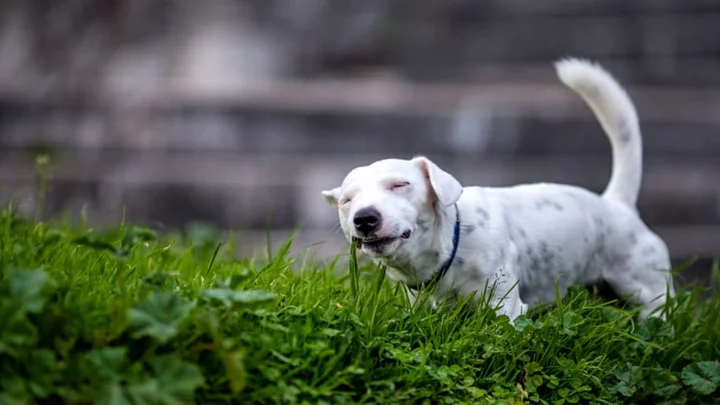If something is edible (or even if it’s not), many dogs will gladly make a meal of it. But if you see your pet grazing on your front lawn like cattle, it may be driven by something more than its undiscerning appetite. Eating grass frantically can be a sign that a dog is sick.
It’s not unusual to see a dog vomit after consuming grass, prompting some pet owners to wonder if their dog ate the grass to soothe its own upset stomach or if the grass is what caused its symptoms in the first place. According Dr. Jerry Klein, chief veterinary officer for the American Kennel Club, this behavior is sometimes a response to symptoms that were already present. “When dogs go outside and gobble grass really quickly, there’s usually a reason, an instinctual behavior to try to induce some kind of gastrointestinal reaction,” he told Mental Floss in 2019. “When they realize they’re nauseous or something else, the only thing they know how to do is to force themselves to vomit. Some dogs that eat grass chomp it down without really chewing it, and often times may vomit something up and that’s how they treat themselves.”
Despite it being a common issue for pet owners, little research has been done into why dogs eat grass. It’s likely that stomach problems only explain this behavior part of the time. In other situations, a dog may eat grass for the same reason it eats your shoes or the groceries you left on the kitchen counter: Because it’s hungry, anxious, or bored.
So how can you tell when your dog is munching grass for pleasure and when it’s trying to induce itself to vomit? Pay attention to the way it eats. Dogs are omnivorous, meaning they eat both plants and animals, so just eating grass alone normally won’t be enough to make it sick. But if a dog is gorging on grass faster than it can chew it, that may be an indication that something is wrong. Whole blades of grass can irritate a dog’s throat and stomach lining, potentially causing them to throw up if they swallow a lot of them in a short amount of time.
No matter the reason for your dog’s grass-eating habits, Klein says that they aren’t a major issue. The behavior shouldn’t be encouraged, as grass in public places can potentially carry harmful chemicals like pesticides, so stop your dog if you see it grazing. But if it shows no signs of illness or discomfort afterward, there’s no need to rush it to the vet. “If I see a dog eating grass, I’m not going to panic,” he said. “I would try to stop it and then monitor it to see how it acts in the next 15 to 20 minutes. Look at how the dog’s acting, its body shape and movement, and the feeling you get from the dog.”
One condition related to vomiting that would warrant a trip to the vet is something called bloat. This happens when a dog’s stomach fills with air, causing it to retch without actually throwing anything up. This is a medical emergency and can be deadly if left untreated.
A dog who vomits after eating grass and looks happy afterward, on the other hand, is probably not a cause for concern—though you may argue otherwise when you’re steam-cleaning your carpet.
Have you got a Big Question you'd like us to answer? If so, send it to bigquestions@mentalfloss.com.
A version of this story ran in 2019; it has been updated for 2023.
This article was originally published on www.mentalfloss.com as Why Do Dogs Eat Grass?.

